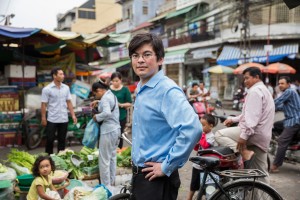 LAW SCHOOL:
Northeastern University School of Law
LAW SCHOOL:
Northeastern University School of Law
STUDENT NAME: Alex Cherup
STATUS: Recent Graduate (class of 2014)
UNDERGRADUATE DEGREE/MAJOR: BA Communication and BA Philosophy
UNDERGRADUATE INSTITUTION: Oakland University, Rochester, Michigan.
HOME CITY/STATE: Troy, Michigan
You need to know two things about Alex Cherup: Before he entered law school, he performed as a stand-up comedian, and he worked as an advocate in the disability community in Nevada. Specifically, he volunteered with AmeriCorps VISTA projects in Las Vegas – with the Nevada Center for Excellence in Disabilities at the University of Nevada, Reno (UNR), and with the self-advocacy group People First of Nevada to support self-advocacy, transition and inclusive employment projects for people with disabilities.
Cherup also presented at disability advocacy conferences around the U.S. with close friend and disability activist Micah Fialka-Feldman. The two spoke about disability rights and the importance of including students with intellectual disabilities in post-secondary education environments. (Fialka-Feldman was appointed to the President’s Committee for People With Intellectual Disabilities in May 2014.)
LAWDRAGON: What were key factors you used to choose your law school?
ALEX CHERUP: From the start, Northeastern University School of Law (NUSL) was one of my top choices because of the public interest and social justice emphasis at the foundation of its curriculum as well as its Cooperative Legal Education Program, which requires all students to participate in four 11-week co-ops in legal practice settings. After visiting the school and learning about the additional clinic programs offered on campus, specifically the Civil Rights and Restorative Justice Project that “conducts research and supports policy initiatives on anti-civil rights violence in the United States and other miscarriages of justice,” I knew that NUSL was the only law school I was interested in attending.
LD: What do you wish you’d known about law school before enrolling?
AC: I wish that I’d had a better idea of how seamlessly my skills and experiences would shape and guide my path as a law student. I was so focused on the LSAT, followed quickly by my law school search and selection, I had little time to reflect on how my non-legal life would fit so well with my time in school before becoming a 1L.
LD: On reflection, what was your most memorable or valuable law school experience?
AC: I had the opportunity of working at the Labour Arbitration Council in Phnom Penh, Cambodia. At the Council, I was able to provide support to the legal team in resolving disputes between workers and employers and with comparative legal research between United States and Cambodian law.
Another valuable experience was at the Centre for Disability Law and Policy at the National University of Ireland in Galway. Given my ongoing interest in disability rights, being able to work with the Centre, a hub for international disability law and policy, was almost too good to be true. Serendipitously, during my time there, I was able to collaborate with “Going to College,” a pilot program that enables students with intellectual disabilities to attend university. A key component to my career in disability advocacy prior to law school focused on programs of this nature in the U.S., so my three months were perfect.
The opportunity to participate in the Civil Rights and Restorative Justice Clinic has been an incomparable experience combining the law, advocacy and history to raise awareness and bring justice nearly 60 years later for horrific killings of African American World War II veterans in Atlanta, Georgia.
LD: What do you plan to do with your law degree?
AC: I hope to continue to advocate for civil rights. My goals have not changed much after three years of law school, though the context in which I hope to apply them has broadened greatly. Prior to law school, my efforts were largely focused on domestic issues; I now hope to work on law and policy at the international level.
An added benefit for a Northeastern University School of Law student is the ability to select co-ops that prepare the student for life after law school. During my second and third year, I participated in co-ops at the NAACP in Las Vegas and at the ACLU of Nevada in Las Vegas, where I will practice law. As a result, I’ve not only expanded my skills in these subject areas, but I also developed a foundation in the community where I will spend my career.
Contact Margot Slade at (646) 722-2623 or margot@lawdragon.com.
